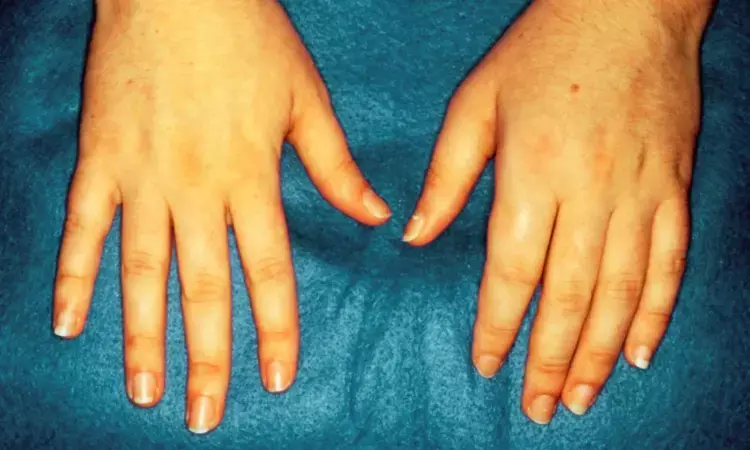- Home
- Medical news & Guidelines
- Anesthesiology
- Cardiology and CTVS
- Critical Care
- Dentistry
- Dermatology
- Diabetes and Endocrinology
- ENT
- Gastroenterology
- Medicine
- Nephrology
- Neurology
- Obstretics-Gynaecology
- Oncology
- Ophthalmology
- Orthopaedics
- Pediatrics-Neonatology
- Psychiatry
- Pulmonology
- Radiology
- Surgery
- Urology
- Laboratory Medicine
- Diet
- Nursing
- Paramedical
- Physiotherapy
- Health news
- Fact Check
- Bone Health Fact Check
- Brain Health Fact Check
- Cancer Related Fact Check
- Child Care Fact Check
- Dental and oral health fact check
- Diabetes and metabolic health fact check
- Diet and Nutrition Fact Check
- Eye and ENT Care Fact Check
- Fitness fact check
- Gut health fact check
- Heart health fact check
- Kidney health fact check
- Medical education fact check
- Men's health fact check
- Respiratory fact check
- Skin and hair care fact check
- Vaccine and Immunization fact check
- Women's health fact check
- AYUSH
- State News
- Andaman and Nicobar Islands
- Andhra Pradesh
- Arunachal Pradesh
- Assam
- Bihar
- Chandigarh
- Chattisgarh
- Dadra and Nagar Haveli
- Daman and Diu
- Delhi
- Goa
- Gujarat
- Haryana
- Himachal Pradesh
- Jammu & Kashmir
- Jharkhand
- Karnataka
- Kerala
- Ladakh
- Lakshadweep
- Madhya Pradesh
- Maharashtra
- Manipur
- Meghalaya
- Mizoram
- Nagaland
- Odisha
- Puducherry
- Punjab
- Rajasthan
- Sikkim
- Tamil Nadu
- Telangana
- Tripura
- Uttar Pradesh
- Uttrakhand
- West Bengal
- Medical Education
- Industry
FOREMOST Trial Reveals Apremilast Enhances Disease Control in Early Oligoarticular Psoriatic Arthritis

USA: The results of the FOREMOST trial indicate that apremilast is effective for patients with early psoriatic arthritis (PsA) and limited joint involvement.
A recent study has provided new insights into treating early oligoarticular psoriatic arthritis using apremilast, a targeted oral therapy. The FOREMOST randomized controlled trial is the first of its kind that specifically focuses on this early form of the disease, and its findings could significantly influence PsA management. It showed that apremilast improves clinical and patient-reported outcomes.
"In the FOREMOST trial, which involved over 300 patients, 33.9% of those assigned to apremilast achieved minimal disease activity (MDA) in "sentinel" joints—those affected at baseline—after 16 weeks. In comparison, only 16.0% of the placebo group reached this level of improvement," the researchers reported in Annals of the Rheumatic Diseases.
"When the assessments were broadened to encompass all joints, the MDA rates rose to 21.3% for the apremilast group, compared to just 7.9% for the placebo group."
Early oligoarticular PsA is characterized by joint inflammation affecting four or fewer joints. It is frequent but rarely studied. To fill this knowledge gap, Laure Gossec, Pitié Salpêtrière Hospital, Rheumatology Department, AP-HP, Paris, France, and colleagues aimed to evaluate the efficacy of apremilast in early oligoarticular PsA.
The FOREMOST trial was a Phase 4 multicenter, randomized, double-blind, placebo-controlled study designed to evaluate the efficacy of apremilast in patients with early oligoarticular psoriatic arthritis. Eligible participants had symptom durations of 5 years or less, with more than one but no more than four swollen and tender joints, resulting in a total of 2 to 8 active joints.
Patients were randomized in a 2:1 ratio to receive either apremilast 30 mg twice daily or a placebo for 24 weeks, with the option for early escape at week 16. The primary endpoint was the proportion of patients who achieved minimal disease activity (MDA) at week 16. MDA was defined as having no more than one swollen joint and one tender joint, focusing on the sentinel joints affected at baseline. The analysis utilized a combination of non-responder imputations and multiple imputations. An exploratory analysis also assessed outcomes across all joints.
Based on the study, the researchers reported the following findings:
- Of 308 patients randomized (apremilast: n=203; placebo: n=105), the mean PsA duration was 9.9 months, the mean age was 50.9 years and 39.9% of patients were using a conventional synthetic disease-modifying antirheumatic drug.
- MDA-Joints (sentinel joints (primary endpoint) and all joints) were achieved by significantly more patients with apremilast (33.9% and 21.3%) vs placebo (16.0% and 7.9%) at week 16.
- Greater improvements in patient-reported outcomes, clinical disease activity, and skin involvement were also seen with apremilast versus placebo.
FOREMOST is a distinctive global randomized controlled trial focused solely on early oligoarticular psoriatic arthritis (PsA).
"We present the primary results of the trial, demonstrating that apremilast led to improved disease control, with a higher rate of minimal disease activity in joints compared to the placebo group at 16 weeks," the researchers wrote.
"These findings indicate that apremilast treatment for early oligoarticular PsA enhances clinical and patient-reported outcomes. This study could help guide appropriate disease management for these patients; however, further research is warranted," they concluded.
Reference:
Gossec L, Coates LC, Gladman DD, et al. Treatment of early oligoarticular psoriatic arthritis with apremilast: primary outcomes at week 16 from the FOREMOST randomised controlled trialAnnals of the Rheumatic Diseases Published Online First: 20 August 2024. doi: 10.1136/ard-2024-225833
Dr Kamal Kant Kohli-MBBS, DTCD- a chest specialist with more than 30 years of practice and a flair for writing clinical articles, Dr Kamal Kant Kohli joined Medical Dialogues as a Chief Editor of Medical News. Besides writing articles, as an editor, he proofreads and verifies all the medical content published on Medical Dialogues including those coming from journals, studies,medical conferences,guidelines etc. Email: drkohli@medicaldialogues.in. Contact no. 011-43720751


